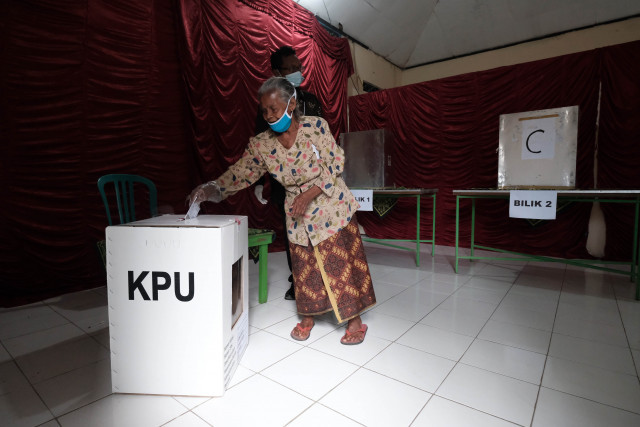Popular Reads
Top Results
Can't find what you're looking for?
View all search resultsPopular Reads
Top Results
Can't find what you're looking for?
View all search resultsScientist warns of up to 10% daily spike in COVID-19 cases following 2020 Pilkada
Regions that participated in Wednesday's simultaneous elections could see a surge in COVID-19 cases, says a scientist, citing a study on 15 developed countries that estimated the true number of infections were 6.2 times more than the reported figures.
Change text size
Gift Premium Articles
to Anyone
A
n epidemiologist has warned of a potential surge in COVID-19 cases in the coming weeks as the polls closed yesterday for the 2020 regional elections (Pilkada).
Dicky Budiman at Griffith University in Brisbane, Australia, has released sobering estimates that Indonesia’s daily infection rate could increase by up to 10 percent and its fatality rate by up to 9 percent.
“I estimate that at least 2.4 million asymptomatic carriers participated in this year’s elections, so we have to prepare for a spike in daily cases,” Dicky said, as quoted by kompas.id on Wednesday.
Read also: Asymptomatic transmission poses ever-present threat: COVID-19 task force
Dicky said his estimate was based on a research paper by Steven J. Phipps, R. Quentin Grafton and Tom Kompas published on Nov. 18 in the Royal Society Open Science journal.
The study, which analyzed the official data of 15 developed countries using a “backcasting approach”, estimated that the true number of infected people in these countries was 6.2 times higher than the reported figures.
The polls also posed a potential “superspreader” event, despite the General Elections Commission (KPU) enacting a new regulation on the health protocols during the elections.
In neighboring Malaysia, which held an election on Sept. 26 in Sabah state, saw a surge in daily infections 10 days after the polls due to high community mobility and broke its own record following weeks of recording a single- or double-digit increase per day, reported the South China Morning Post.
The 2020 Pilkada also carried a high risk of COVID-19 transmission, not least because millions of Indonesians cast their ballots in person at polling stations (TPS) in elections held simultaneously in 270 regencies and municipalities. At the same time, numerous local poll administrators (KPPS) equipped with PPE visited hospitals and isolation facilities to collect the ballots of voters with COVID-19, while more than 1,000 KPPS continued to man the polls despite their reactive results from rapid antibody tests.
“There were 1,172 officers who are exposed to COVID-19 and were still present at [TPS]. Of course, we need to confirm the figure in the field and ascertain their COVID-19 status,” said Mochammad Afifuddin of the Elections Supervisory Agency (Bawaslu).
Bawaslu also found that several TPS lacked special booths reserved for voters with a body temperature of above 37 degrees Celsius, a required facility for reducing the transmission risk on voting day.
On Monday, two days before the simultaneous elections on Dec. 9, the South Sulawesi General Elections Commission (KPUD) revealed that hundreds of poll workers in 12 out of the 24 regencies and cities in the province had shown reactive results in their COVID-19 rapid tests.
South Sulawesi KPUD commissioner Fatmawati Rahim said on Monday that the poll workers’ test results were still coming from all regencies and cities, and that the commission would only allow healthy KPPS to at the polling stations.
“Since we are two days from election day, we have to ensure that every officer on duty is in perfect health. Those who have shown reactive [test] results will be relieved from duty,” she said.
Fatmawati noted that those regions with a low number of COVID-19 cases, such as Maros and Barru, had reported only a few KPPS who returned reactive results, while areas with a higher number of infections reported more poll workers with antibodies to the virus. Makassar recorded the highest number of with reactive results from 400 poll workers, followed by Gowa with 140. (dpk)
Editor’s note: This article is part of a public campaign by the COVID-19 task force to raise people’s awareness about the pandemic.










